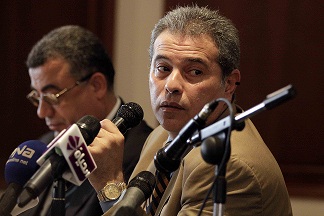While crowds of shiny happy people rushed to the Queen tribute concert at the air conditioned Wisdom Hall of Sawy Culture Center last Wednesday, a handful made their way to the open air River Hall on an exceptionally hot summer night to watch the Maadi rock outfit Cairokee.
The band opened the small, intimate gig with a song that stands against the sappy commercial mainstream Egyptian music, setting the mood for the entire concert.
“This is not a fairy tale, Amir Eid, the band’s front-man, declared, “There are no happy endings in here; this is not a song of peace, this is not a song of hope. The unusual opening lines were a prelude to what’s to come: a highly appealing simple acoustic rock concert that is quite rare to witness in Egypt nowadays.
Cairokee comprises of a group of friends who have known each other almost all their lives. The Wednesday concert consisted of a minimalist acoustic ensemble, featuring only three members of the band: Amir Eid (rhythm guitar, harmonica, vocal), Sherif Hegazy (lead guitar) and Ahmad Bahaa (percussions). The concert essentially appeared like an informal soft jamming session. Despite the consistently poor facilities provided by the River Hall, the sound was brisk and clear, adjusted for the band by Wust El Balad’s lead singer Hany Adel who acted as the sound engineer for the night.
The band’s lyrics are infused with various everyday images from present Egyptian society; from the downbeat, monotonous newscasts and television shows to the smoke and noise emitting from every corner of the capital.
“Songs nowadays make me feel like everybody is in love, as if people wake up, eat, drink and sleep in love. It’s a lie, it doesn’t reflect reality, Hegazy told Daily News Egypt.
The Wednesday set prominently reflected the band’s themes. Enveloping their heavy subjects with wry lyrics and playful music, Cairokee often sound like a cynical outsider, regarding the world with a defeated laugh.
“El Fuul wel Lahma (Beans and Meat), for example, highlights the poor’s struggle for food, and the government’s indifference and naivety in dealing with poverty. The serious subject was presented with aggressive humor that succeeded in conveying the message without plunging into the usual manipulative sentimentality.
Despite its proficiency, a misplaced drum solo interrupted the generally melancholic mood that prevailed throughout the performance. The band made up for it straight after with “Valarie, a fan-favorite and one of their signature songs, written by great contemporary Egyptian poet Ahmed Fouad Negm. Negm’s lyrics take a jab against nearly every persisting ill in society, from education and American cultural colonialism to failed Arab unity and consumerism. The band’s bittersweet melodies enriches Negm’s lyrics to deliver a grand statement of a lost society entrenched in contradictions.
There were of course the obligatory love songs, but even the most traditional cut of the set was surrounded by an aura of despair rather than romanticism.
Vocals are clearly not the band’s forte, lacking vigor and drifting slightly towards the nasal. However, the spontaneous arrangement of rhythm guitar, lead guitar and percussions easily masked Eid’s voice.
Eid writes most of the band’s lyrics, while a fair share of the Cairokee repertoire are based on Negm’s poems. All band members though contribute in writing the music. The fundamental sound of the band is quite familiar, inspired by The Beatles, Oasis and The Cranberries in addition to Barclay James Harvest, whom the band’s cites as their biggest influence.
Through the past few years, Cairokee has attracted a sizable devoted following, yet their expectations are as realistic as their lyrics. “We’re never going to be so popular that the whole of Egypt will be listening to us, said Sherif.
Cairokee is hoping and expecting a revolution in Egyptian music and want to help induce the change in the alternative music scene that’s rapidly heading towards formalism. They don’t mind dabbling with failure if they succeed in contributing to such change.
“Everyone wants to be at the finish line and be as famous as Amr Diab. It’s just like a war, no one wants to be in the frontline because the soldiers there are the first to go, everyone wants to be at the end and reap the glory, said Hegazy.
The band is currently working on a website to publish their music. “What we want is to publish our music for free for everyone to listen to, Hegazy added.
“We’ve tried label companies and that doesn’t work; everyone wants to do things their way and they’re not used to dealing with bands. It’s a big risk to try and make it, especially with everyone wanting control. We’d rather do things our way because if we fail, we’d have at least done it our way.

